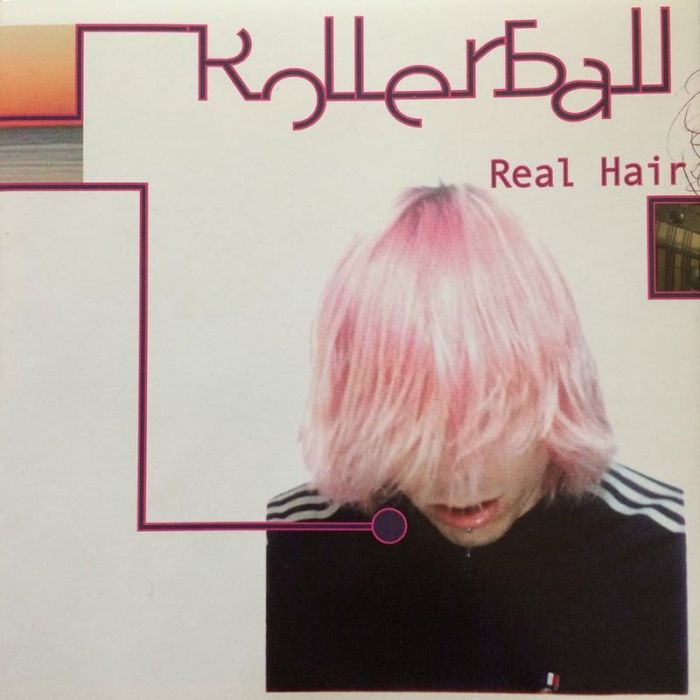Real Hair by Rollerball (Review)

Just when I think I have those merry pranksters over at Silber figured out, they somehow manage to spring a new one on me. At first, I thought they were a drone-oriented label (thanks to Aarktica’s stellar No Solace In Sleep). But they’ve veered off into minimalist soundscapes (If Thousands) dark-ambient pieces (Kobi), more drone (Small Life Form), folk (Rivulets), industrial (Clang Quartet) and even a wee touch o’ goth (Lycia). And then along comes Rollerball’s Real Hair, which carves out its own unique niche in Silber’s catalog.
Just as with Silber, there’s a sense of unpredictability about Real Hair. When you think you have the album figured out, the band seems content on frustrating your expectations. And that starts with the cover art, which, with its typefaces and pink hair, made me wonder just what the heck I was getting into.
The album’s first 3 tracks are darkly orchestrated pieces that traipse about just beyond the periphery of !!! and Out Hud’s albums like some tattered gypsy caravan or danse macabre. While nowhere near as spastic and hip-shaking as !!!, there’s an undeniable sense of rhythm and groove that could get toes tapping and heads nodding (just listen to “Girls Hugging Trees“ ‘ mariachi horns and grunting bassline) — or send shivers down your spine, Pleasure Forever-style. These songs possess a murky, almost cabaret-esque atmosphere, courtesy of the serpentine pianos and accordions and strange lyrics (“I forgot the taste of cold, sanitized steel”) that haunt the songs’ corridors.
However, “Mike’s Mind” sounds just like the title implies, a wandering journey through a clouded mindscape littered with smatterings of trumpet, snippets of piano, and scattered drums; altogether, it sounds vaguely like Supersilent’s work on the stunning 6. On the other hand, “Hecho En” slowly unfurls itself in the finest Do Make Say Think tradition. Female vocals float lazily amidst undulating accordions, billowing horns, and sparse percussion… before suddenly morphing into something the Volga boatmen might hum as they march alongside the River Styx. And even that disappears within a cascade of sad, wavering notes that, despite sounding somewhat out of place, nevertheless add a haunting touch.
“Spine Delay” dishes out the album’s most bizarre moment, a quasi-hip-hop collage that sounds like Soul-Junk splicing together their own version of Beck’s Midnite Vultures. However, that lasts all of 2 minutes before giving way to murky organs, shuffling drums, banshee-like feedback, and more cryptic lyrics (“Spine delay/I sway/And I shimmer down to my knees”).
Even after all that’s transpired on the album so far, “Bara” still might be the album’s most schizophrenic song, alternating between drunken uproars in which pianos, horns, and drums sound fully intent on crushing every bit of china within reach, and moments that sound almost Out Hud-esque with their pulsing electronic synths and rhythms. The electronic, uptempo moments are more interesting, and as such, I find it hard to get into the song as a whole simply because I never know how long it’ll be before the song grows surly again.
“Eight Inch Nun” ends the album on a rather restrained and calm note… or so it seems at first. Over another mercurial soundscape of scattered drums, wordless vocals, and droning horns, a low voice recites the album’s strangest, most cryptic lyrics — picture a cross between medieval alchemical imagery, socio-political commentary, and stream-of-consciousness psychedelia (a sample: “Elaborately framed portraits of multi-cultural lovers, tongues entwined, genitalia serpentine, and sprouting the luckiest four leaf clover in the world/It is beautiful all engulfing fire”). As with much of Real Hair, it doesn’t make much rhyme or reason, and yet can be captivating and intriguing.
Still, as much as I like to be kept on my toes by an album, I have to say that I much prefer the moments on the disc when Rollerball exhibits more focus. While I enjoy the more bizarre and abstract sounds that are sprinkled liberally throughout the disc, Rollerball is most successful when they can take those abstract sounds and work them into a more defined, song-oriented context. When they do so, the result (such as “66 Deadhead Spies” or “Starling”) is all that much stronger and more captivating because of it.